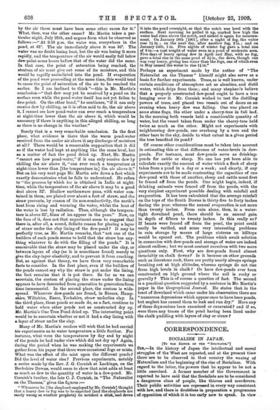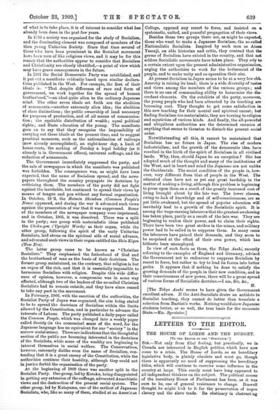CORRESPONDENCE.
SOCIALISM IN JAPAN.
[To VIZ EDITOR OF MR srEcTsro5.”1 Sin,—In the history of Japan the intellectual and moral struggles of the West are repeated, and at the present time there are to be observed in that country the waxing of Naturalism and the beginning of the rise of Socialism. With regard to the latter, the powers that be appear to be not a little exercised. A former member of the Government is reported to have said that the Socialists are to be considered a dangerous class of people, like thieves and murderers. Their public activities are repressed in every way consistent with law, and there is doubtless in preparation a programme of opposition of which it is too early now to speak. In view
of what is to take place, it is of interest to consider what has already been done in the past few years.
In H98 a society was organised for the study of Socialism, and the dominating element was composed of members of the then young Unitarian Society. Since that time several of those w ho have been prominent in the Socialist movement hays been men of like religious views, and it may be for this reascn that the authorities appear to consider that Socialism and Christianity are closely identified,—a point of view which may have grave consequences in the future.
In 1901 the Social Democratic Party was established, and it put cut a manifesto evidently based upon similar declara-
tions published in the West. For example, the first of their ideals is : "That despite difference of race and form of government, we work together for the spread of human brotherhood,"—an ideal quite alien to the ordinary Japanese mind. The other seven ideals set forth are the abolition of armaments,—another extremely alien idea; the abolition of class distinctions ; the public ownership of land necessary for purposes of production, and of all means of communica- tion; the equitable distribution of wealth; equal political rights ; and State education of the young. The manifesto goes on to say that they recognise the impossibility of carrying out these ideals at the present time, and to suggest practical measures, such as the nationalisation of railways (now already accomplished), an eight-hour day, a limit of house-rents, the making of Sunday a legal holiday (as it already is in Government offices), universal suffrage, and the reduction of armaments.
The Government immediately suppressed the party, and the sale of newspapers in which the manifesto was published was forbidden. The consequence was, as might have been expected, that the name of Socialism spread, and the news- papers throughout the country propagate its doctrines by criticising them. The members of the party did not fight against the inevitable, but continued to spread their views by means of tongue and pen without any formal organisation.
In October, 19 '3, the Heimin Shimbun (Common People's Hews) appeared, and during the war it advanced such views against the prosecution of war that it was suppressed. Some of the members of the newspaper company were imprisoned, and in October, 1905, it was dissolved. There was a split in the party; one group with materialistic ideas published
the Choku-g en ( Upright Words) as their organ, while the other group, following the spirit of the early Unitarian Socialists, laid stress on the spiritual side of social advance, and advocated such views in their organ entitled the Shin Sig en (New Era).
The latter group came to be known as "Christian Socialists." They emphasised the fatherhood of God and the brotherhood of man as the basis of their doctrines. The former group maintained, on the contrary, that religion is but an organ of the rich, and that it is essentially impossible to harmonise Socialism with religion. Despite this wide differ- ence of opinion, however, a compromise was in some way effected, although two of the leaders of the so-called Christian Socialists had to remain outside, and they have since ceased to take any part in the movement.
In February, 1906, with the sanction of the authorities, the Socialist Party of Japan was organised, the aim being stated to be to spread the doctrines of Socialism within the limits allowed by the Constitution, and in particular to advance the interests of Labour. The party published a daily paper called
the Common People, which was changed into a weekly paper
called Society (in the economical sense of the word, for the Japanese language has no equivalent for our "society" in the narrow social sense). There are indications that the thoughtful section of the public are becoming interested in the doctrines of the Socialists, while some of the wealthy are beginning to interest themselves in social welfare. The Conservatives, however, extremely dislike even the name of Socialism, con- tending that it is a great enemy of the Constitution, while the authorities continue their hostility, although they could not in justice forbid the organisation of the party.
At the beginning of 1908 there was another split in the Socialist Party. One group, led by Kotoku, being disappointed in getting any extension of the suffrage, advocated Anarchistic views and the destruction of the present social system. The other group, led by Katayama, one of the earliest of Japanese Socialists, who, like so many of them, studied at an Amerlc.ur
College, opposed any resort to force, and insisted on a systematic, united, and peaceful propagation of their views.
Besides these two groups there are, as might be expected. those who want to make a Japanese Socialism, the so-called Nationalistic Socialists. Inspired by such men as Aizan Yamaji, an able historian and critic, they contend that the germs of Socialism have existed in the country, and that not
seldom Socialistic movements have taken place. They rely to a certain extent upon the present administrative organisation, urging the authorities to work for the betterment of the people, and to make unity and co-operation their aim.
At present Socialism in Japan seems to be at a very low ebb. Anarchy is raising its bead; there is a wide diversity of tastes and views among the members of the various groups ; and there is no one of commanding ability to harmonise the dis- cordant elements. On the outskirts of the party, moreover, the young people who had been attracted by its teaching are
becoming cool. They thought to get some satisfaction in this new teaching for their mental and spiritual unrest; but
finding Socialism too materialistic, they are turning to religion and mysticism of various kinds. And finally, the all-powerful and ubiquitous authorities are the determined enemies of anything that seems to threaten to disturb the present social order.
Notwithstanding all this, it cannot be maintained that Socialism has no future in Japan. The rise of modern industrialism, and the growth of the democratic idea, have resulted in the birth of the spirit of Socialism in all civilised lands. Why, then, should Japan be an exception P She has adopted much of the thought and many of the institutions of the West, and in heart and mind the Japanese are not unlike the Occidentals. The social condition of the people is, how- ever, very different from that of people in the West. The educated class have not as yet any great hardship in the matter of making a living, although this problem is beginning to press upon them as a result of the greatly increased cost of living brought about by the late war. The lower classes,
owing to lack of knowledge and of self-consciousness, are as yet little awakened, but the spread of popular education will inevitably lead to a growth of the Socialistic spirit. It is
among the wage-earning labourers that the greatest awakening has taken place, partly as a result of the late war. They are beginning to realise their power, and to claim their rights.
There have been two great strikes in the mines, and military power had to be called in to suppress them. In many cases
the labourers have gained their demands, and they seem to be surprised at the effect of their own power, which has hitherto been unemployed.
In view of such facts as these, the Tokyo Asahi, recently referring to the examples of England and Germany, advised the Government not to endeavour to suppress Socialism by resort to force, but rather to try to lead its forces into better paths. It appears that if nothing be done to satisfy the growing demands of the people in their new condition, and in their consciousness of new power, there will be a great spread of various forms of Socialistic doctrine.—I am, Sir, &c.,
[The Tokyo Asahi seems to have given the Government excellent advice. If the Anti-Socialists desire an antidote to Socialist teaching, they cannot do better than translate a selection from Bastiat's works. Nothing would show Japanese students better, or so well, the true basis for the economic State.—ED. Spectator.]











































 Previous page
Previous page